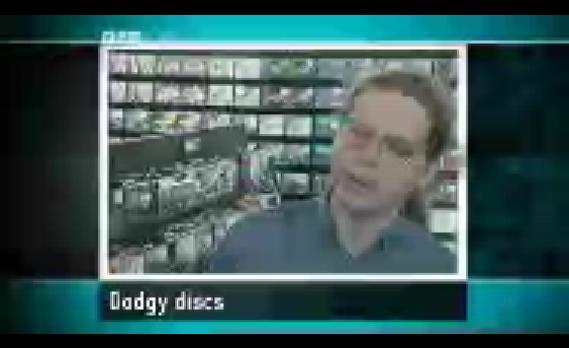On Wednesday I was filmed by the BBC to appear on yesterday's BBC Three News, talking about music piracy. (If you're quick, you can see the programme, but that link will only last one day.) I don't even own a television and have never appeared on TV before, so this was quite novel. In the web log tradition of shameless self-publicity, I'll tell you all about it....
The background to the story is that the British Phonographic Industry have produced another report about the extent of commercial copying of CDs -- they claim that a billion counterfeit CDs were distributed last year. (This area is a statistical minefield; for instance, the BPI's report has a big whinge about people copying music onto recordable CDs, but of course they have no way of knowing how many of the CD-Rs sold are used to make copies of music CDs. So they pluck a number out of thin air -- 60% -- and then say, in effect, that every CD-R sold results in a loss of 0.6 × the cost of a CD album. Figures like these are nonsense, but get wide coverage anyway.) BBC Three wanted to do a story on this and I wound up in the rôle of Campaign for Digital Rights spokesperson.
I appear on the programme for only a few seconds, but it took about an hour and a half to get the footage (of which probably about ten minutes was actually filming). Filming took place in the Fopp record shop in Cambridge, to set the right scene for the story. (The manager of Fopp gave permission for us to film, though he asked that a Fopp logo appear in shot somewhere. I don't think one did, which I suppose represents a small victory for licence-fee payers. He also had to 'phone Mission Control in Glasgow to confirm that we could film -- so much for the independent record store....)

Getting ten seconds of film involved me standing in front of the camera answering a few minutes of questions put to me from off-camera by BBC journalist Keith Miller. This was a bit disconcerting, partly because I was too dim to realise that the viewers wouldn't hear the questions being asked me until I'd been told this several times. Keith had a set of questions, starting with `how did the record companies get into this mess' and moving on to `what can they do about it'. I'd been worried about this being a more formal interview in which I'd have to make involved statements justifying my position, but in fact all that was required was a soundbite, which I think I supplied adequately without too much umm-ing and err-ing:
In India a CD, a chart CD costs three pounds; in Hong Kong it costs five or six pounds. The record companies are trying to charge what the market will bear, and the market won't bear it any more.
-- which is roughly the statement I set out to make.
After filming the BBC guys got a taxi back to the station, and gave me a lift to where I was having lunch. The taxi driver, having asked what story they'd been reporting, launched into a long rant about how CDs are too expensive, and singing the virtues of Napster, Kazaa and CD-R. Most of the music available on file-sharing networks was, he said, modern crap that he didn't like; instead he copied his friends' CDs. Two thirds of his CD collection was copied. He'd got the recent Oasis album from the internet though, and told us that he wasn't too worried about the personal wealth of the brothers Gallagher.
Now, it's important to point out that all of that is copyright infringement, and is therefore Bad and Wrong. But arguably, he might have made a more effective TV spokesperson than I did....
(End of shameless self-publicity. Well, excluding the rest of my web log, anyway.)
In other news
- ``Hallucineering'' -- When Imagineering Gets Stoned.
- One from Mark: ``Dagenham East'' should mean ``slightly mad'', on the grounds that it's a few stops short of Barking. (Depends, of course, on which way you're going; heading away from town, it's ``a few stops beyond Barking.'')